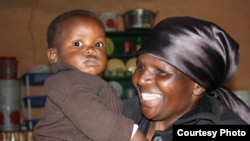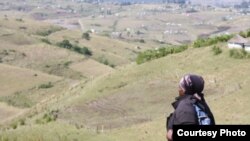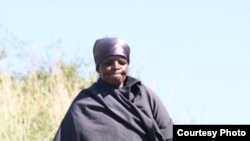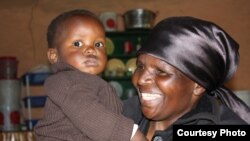This is Part Five of a five-part series on Child Health in South Africa
Continue to Parts: 1 / 2 / 3 / 4 / 5
ZIDINDI, South Africa - An arctic gale pummeled the mud walls of the hut and threatened to rip off its thatched roof. Inside the one-room structure, an older woman and her twenty something daughter held a baby swaddled in blankets between them, as the temperature plummeted further.
Nongezi Sinkile,55, couldn’t hear herself pray as the first storm of the winter season tore through Zidindi District, a remote part of South Africa’s Eastern Cape province.
It was a few minutes after midnight, and Sinkile was begging God to spare the life of her one-year old grandson, Luphumlo.
A few days before, she and the boy’s mother – her daughter, Nosintu – had taken him to the local clinic. He was suffering from intense diarrhea and was vomiting profusely. A nurse had provided them with medicines to give to Luphumlo. But they didn’t help him and his condition deteriorated.
Sinkile was convinced that the child was dying.
“He couldn’t breathe. He looked like a fish on the sand, gasping for air. His lips were dry and blue. He was vomiting until the vomit was no more,” she recalled.
Luphumlo needed urgent medical help. His grandmother realized she and her daughter would have to get him to the nearest hospital as soon as possible. But it was 12 kilometers (7.5 miles) away, and they had only 20 rand ($2.50) between them – enough only for a small part of the transport fare needed.
They would have to walk most of the way to the hospital, to a point where they’d be able to afford to take a minibus taxi to the facility.
Almost half of all South Africans have to walk to hospitals and clinics when they’re in need of medical attention, according to a nationwide survey completed by the government-affiliated Statistics South Africa in 2010.
I
Ncedisa Paul, who works for the Philani health NGO, said poor people living in isolated areas of South Africa often walk for five hours and more to get to their nearest medical facility.
“It can take them the entire day to get there and back and, if they arrive too late, they have to sleep over on a hospital bench or outside to see a doctor the next day. Some people simply die in the bush or along the road before they get to hospital; others die before they get a chance to see a doctor,” said Paul.
No romance
Like almost everyone in the district of 130,000 people, where the unemployment rate is almost 100 percent, the Sinkiles are poor. But they’re fortunate compared with most others in Zidindi. They at least have a small income – 560 rand (about $70) a month in state child-support grants for Luphumlo and Nosintu’s first-born son.
“I just want to thank my dear God for the money that we get every month, when most people here get nothing,” said Sinkile. “My child and grandkids are well covered (with clothes); I’ve got food at home. That is one thing that keeps me going and to smile at all times. I do my garden here; I’ve got spinach; I’ve got everything. So, I’m happy.”
But the family’s meager income means there’s money for only the barest of essentials. And on that icy night when Sinkile’s grandson was gravely ill, they certainly couldn’t pay the hundreds of rand needed to hire a private vehicle to speed them to the hospital.
Sinkile decided they would wait a few hours and start walking shortly before dawn, when there was some light to guide them across the region’s treacherous terrain. In Zidindi, there are no tarred roads, only rough tracks. When dry, they’re rocky and dusty. When wet, they turn to ochre red mud.
From afar, the seemingly endless green hills that break the horizon are a pretty postcard picture. But traversing them ends any notion of romance. They rise steeply and plunge into deep valleys and gorges, their warbling streams fast becoming muddy torrents during heavy rain.
Hysterical
As a semblance of shine from the sun’s first rays began breaking the early morning darkness, Sinkile and her daughter prepared for their tortuous journey to the hospital. But as they were about to leave, Nosintu became hysterical, her mother said.
“She thought Luphumlo had stopped breathing. Then I thought to myself, ‘I must be the strong one if we are going to save this boy,’” Sinkile recalled. She tied her grandson to her back with a blanket.
Then they left their hut.
Even though she knew thorns would tear it, Sinkile was wearing a long black dress. She was in mourning. Her husband had died eight months before, his lungs ravaged by a disease contracted from decades of work underground in a platinum mine in northern South Africa.
The bush was alive with the sound of countless insects. A stray dog barked at the Sinkiles as they struggled up the first hill. In the distance the seething sea that characterizes the rugged shoreline known as the Wild Coast roared in the distance. The sun began to illuminate the skeletons of ships that jutted from the jagged rocks and white beaches, wrecked down the years by one of the roughest stretches of ocean on the planet.
Birth on rock
Sinkile checked on Luphumlo.
“He was screaming so much but no sound was coming out of him. The mouth was wide open and dry, and you (could) see that the child is very sick. I was very worried. I thought, ‘This child is going to die.’ But I turned to my daughter and smiled and told her, ‘He is doing fine,’” she said.
They labored on. On the slopes of yet another hill that by this time felt to their aching bodies like a mountain, they approached a large rock. Sinkile recognized it as the same boulder on which her niece had given birth about two years before. The woman’s water had broken late one night and she and her husband had also tried to walk to the hospital.
They never made it.
“She gave birth on this very rock,” Sinkile said, patting it almost with affection. “Her husband wrapped the baby in his jacket. It took them another four hours to get to the hospital so the baby and mother could be assessed. That baby is well today, but it is very lucky….”
No charity
After walking for about two hours, the grandmother, still carrying her grandson, and her daughter, reached the gravel road that led to the tarred highway from where they would be able to hail a taxi to the hospital.
Then something happened that Sinkile said she’d never forget. A white van pulled alongside them. The driver asked her if they needed a lift to the highway. When she said yes, he demanded money.
Sinkile said she explained to him that all they had was 20 rand but that they needed the money to pay for a taxi to the hospital. She recalled that she’d begged the van driver, “Please sir, this child on my back is very ill; please take us to the highway and give me your details and I will pay you next month….”
But the man sped away.
Sinkile reflected, “Life is hard for everyone here. He also needed money, I suppose. No one can afford charity in this place. Only rich people can show charity.”
Thousands die
After another hour of trudging, the family reached the tarred road. They’d been walking for more than three hours. “It took us so long because we had to stop and look at the child (to see) if he’s still breathing. And also we had to change his nappies all the time; the diarrhea was just flowing all the time,” said Sinkile.
Luphumlo was sweating but his skin was cold. He was still vomiting and suffering intense diarrhea. But the driver of the first taxi they approached refused to leave for the hospital until his vehicle was fully loaded with passengers.
The Sinkiles waited for what seemed to them like hours more before departing. They eventually arrived at the hospital shortly before noon – about six hours after they’d left home.
A nurse immediately inserted a drip into the baby’s arm to replace lost fluids. They still had to wait almost two hours to see a doctor. Public health facilities in South Africa are strained to the limit.
Luphumlo was diagnosed with acute gastroenteritis – inflammation of the intestines – and admitted. He spent the next 10 days in hospital.
Again, the Sinkiles count themselves as fortunate. Every year thousands of children in South Africa die of simple diarrhea because their relatives are too poor to afford to immediately access medical care.
Back at Nongezi Sinkile’s homestead, another morning dawns. The grandmother chases chickens from her vegetable garden.
She doesn’t know what the new day will bring -- maybe another illness, maybe another torturous journey on foot to the hospital.
Whatever it is, Sinkile said, she’s ready.
“I am very strong; I am very strong. I know that,” she said emphatically.
Then, amid a choir of crickets and squawking chickens, Sinkile laughed, and said, “God is the only thing that’s stronger than a granny.”








